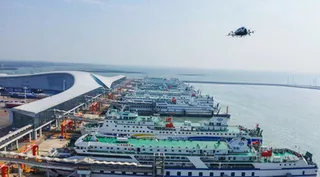The Ripple Effect of Widebody Retirements on Pilots
Contact Our Team
For more information about how Halldale can add value to your marketing and promotional campaigns or to discuss event exhibitor and sponsorship opportunities, contact our team to find out more
The Americas -
holly.foster@halldale.com
Rest of World -
jeremy@halldale.com

Over the next several weeks CAT will be releasing a series of commentaries addressing training issues in resuming airline service, post-pandemic. In this initial #RestartingTheEngines article, Rick Adams talked with Jacques Drappier about aircraft types that may not see service again and the impact on training needs.
From Hong Kong to Victorville, there are more than 17,000 aircraft parked at airports and long-term storage facilities – about two-thirds of the world’s airline fleet. Some of these aircraft aren’t expected to return to passenger flight operations.
“Magnificent planes like the B747 and A380 will be disappearing from the skies,” said Jacques Drappier, former Airbus VP Flight Ops and Training and Chair of CAT magazine’s annual Asia Pacific Airline Training Summit (APATS).
“Even before the crisis the widebody market was not doing well. With the travel restrictions and weak forecasts for the coming years, it is obvious that the “Big Jumbo” days are over. Many of these parked aircraft will never leave the ground again,” Drappier told CAT.
Lufthansa announced it is retiring six Airbus A380s, five Boeing 747-400s and seven Airbus A340-600 aircraft. British Airways and Iberia parent IAG is reportedly considering accelerating the retirement of some 747-400s and Airbus A340-600s. Virgin Atlantic retired its last three A340-600s last month. Delta Airlines CEO Ed Bastian said the airline will accelerate retirements of its remaining McDonnell Douglas MD88 and MD90 fleets, as well as some older Boeing 767s. American Airlines announced plans to retire all 757s and 767s earlier than expected, as well as 76 of their 328 Boeing 737-800s, all nine of their Airbus A330-300s, and all 20 of their Embraer 190s. Swedish regional carrier BRA is mothballing its RJ85 and RJ100 aircraft.
“For smaller aircraft types, some airlines might scrap older planes and opt to bring in newer fuel-efficient planes,” Drappier said. “However, with the present fuel price being so low, there are good arguments to bring back older planes that are paid for and defer delivery of the newer planes that require capital that the airlines are very short of. So we might see very different fleet decisions depending on capital available, purchase contracts and fuel price.”
Resuming operations may not be as simple as curtailing them. Fleet decisions will have direct consequences on flight operations and training. For example, if an airline decides to ground a type such as the B747, Drappier explained: “There are a lot of crews, mostly senior, that need to be retrained to a smaller type, and this starts a cascade of retraining with ultimately furloughs on the bottom of the seniority list. This can be partly avoided by allowing senior captains to retire early, and new contract negotiations with the pilots to relax seniority rules, but neither will be easy to do.”
For the nearly 300,000 pilots currently not flying, “recency” will soon become an issue. In the UK, for example, a pilot must do three takeoffs and landings within the previous 90 days, one of which uses autoland. There’s also an annual Licence Proficiency Check and an every-six-months Operational Proficiency Check by the airline; these are typically done in a Level D full-flight simulator, so there will be high demand for FFSs in the early days when scheduled passenger flights begin to ramp up again. (Also, new health safety measures may need to be implemented in simulators and training facilities.)
In parallel, cabin crew will need refresher training on safety procedures and whatever new sanitary measures are implemented by airlines in the efforts to prevent recurrent spread of the virus.
Part of CAT Magazine's Restarting The Engines series.


